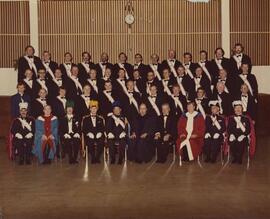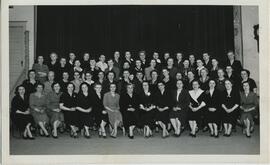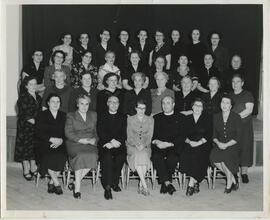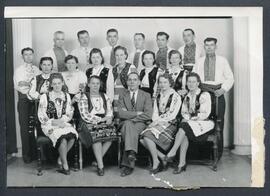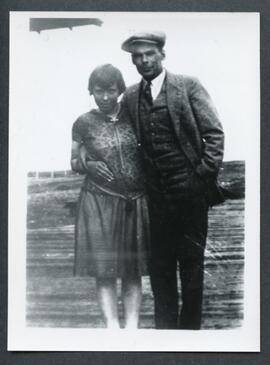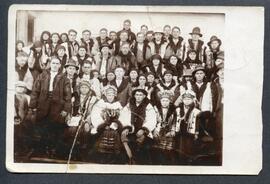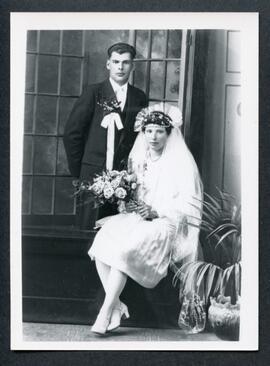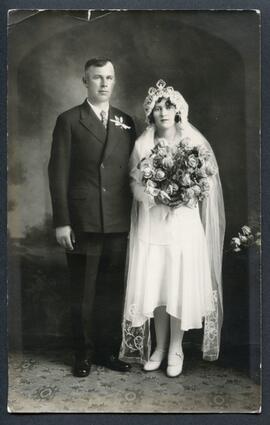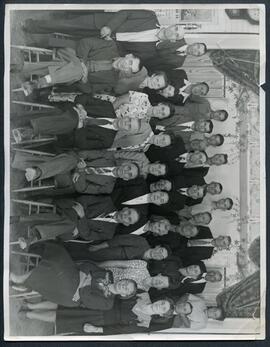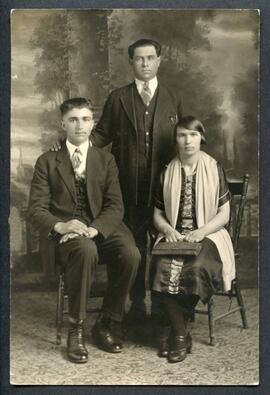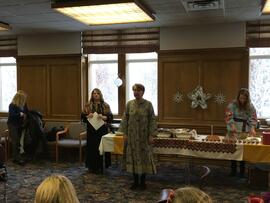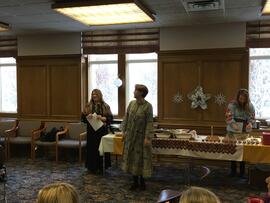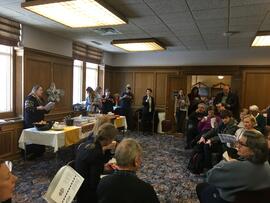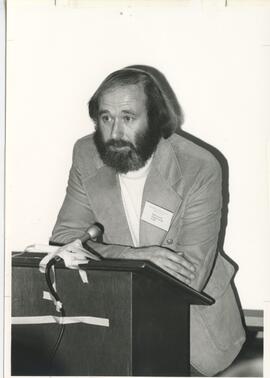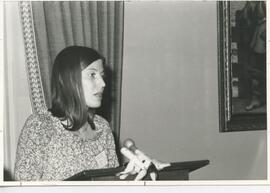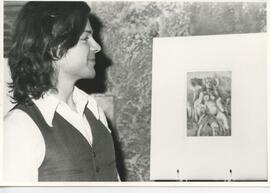Inscription on back:
"Emily Swist President 1950-52"
Newcastle AUC photo for 1496 program. Fred’s mother middle row, 3rd from right. Fred’s father middle row, 1st from right.
Fred’s mother and father on wedding day. Standing on a train platform in Newcastle, Alberta.
Photograph of wedding in Roznov, Ukraine. Wedding was for Annie (Troich) Paranchych’s sister, Arlene.
Photograph of Annie (Troich) and Alex Paranchych. Photo was taken after they were married in a photo studio where they borrowed the dress and suit for the wedding. Same as 2019.010.021
Photograph of Mr and Mrs Yukobaski who sponsored Fred Paranchych’s mother, Annie Troich, to come to Canada. Mrs Yukobaski is Annie Troich’s cousin.
Photograph of the members of the AUC in Newcastle, AB. Fred Paranchych’s brother Bill is standing centre back row, without a suit jacket. Fred’s father, Alex, is in the 3rd row, 3rd from the left. Fred’s mother is centre 2nd row, partially hidden.
Photograph of relatives of Fred Paranchych, taken in Roznov Ukraine.
Jelena Pogosjan, Director of the Kule Folklore Centre, is greeting the guests.
Jelena Pogosjan, Director of the Kule Folklore Centre, is greeting the guests.
MLCS Chair Dr. Carry Smith offering her greetings.
This item is an interview conducted on June 15, 1981. Veronica Whitfield interviewed Mr. Herklotz. Mer. Herklotz talks about his family, being in the Soviet Army in WWII, and coming to Canada in 1948 and learning English.
UntitledThis item contains two recordings of interviews conducted in the summer of 1982 in Edmonton, AB. The first interview was conducted in English with Eugene Weber. Mr. Weber was born in Scott, SK in 1932 and the interview discusses the history of his family before and after his birth, and the importance of German community.
The second interview was conducted with Mr. and Mrs. Sommer in Polish, German and English. In the interview, they discuss Mr. Sommer's history of being born in Rivne (Volyn), where his mother also born. His grandfather worked as a basket maker, his father was a farmer in Volyn (Poland). The name of the village was [Maschk]. The father of Mrs. Sommer died after the WW1 and she grew up in another family. In the year 1914, when the WW1 started, Russians took all Germans from Volyn to Siberia. In the year 1916, at the age of 19 he was taken from Siberia to the Russian army. He had to fight at the Russo-Turkish war. In the year 1918, he came from the war to Kostanay after serving in the Russian army. In 1921 he came back to Volyn. His wife and him grew up in the same village and got married in 1923, first lived at her uncle´s place. His older brother lived in Canada and helped his brothers move there too. They came to Canada in June 1929. They came from Maschk to Rivne by train, came to Halifax from Danzig by ship. After they took the train to Edmonton and New Sarepta. After the arrival they stayed at the immigration camp. At the time of immigration they already had three children (born in 1924, 1926 and in 1928). Later they had one more baby (daughter) in Canada.
UntitledThis item contains an interview with Zdzisław Jan Krywkowski, conducted in Stoney Plain, AB on April 19, 1977. The
How did he come to Canada during the war? He came completely legally, from Switzerland where he had been a student. He studied political sciences at the international labor office. Then he came to France, where the so-called 4. Polish division was formed. He never took part in any battle as there were not enough people. He embarked a ship close to Bordeaux in 1940 and arrived in Plymouth. He English were much friendlier than the French from whom the had received no information. As he spoke some English, he went around with a colonel called Koszałkowski Marian. Afterwards, they were brought to Glasgow, then they were living in tents. He spent the whole war in Britain, predominantly in Scotland. He joined the 1. Corps of the Polish Army (the 2. Corps was commanded by General Anders). Among his superiors were General Maćko, his direct superior was Karol Kraćkiewicz (or Kraśkiewicz). In 1944, the worked for the Ministry of Foreign Affairs, on Jewish matters. They countered the propaganda (also in the English press) that all Poles are anti-Semites and that they are persecuting the Jews together with the Germans.
His parents remained in Poland, they spent the war there. He calls Włocławek his native city although he was born in Warsaw, but he spent only four years there. His mother was the headmaster of a large school in Włocławek, a former student of her (an ethnic German) warned her after the German invasion in Poland, and his parents relocated to Warsaw. His father spent a part of the war in Żarnów close to Opoczno, his native village. He recalls a family legend that his ancestors came from Ukraine during one of the Cossack uprisings.
Why did he come to Canada? In Scotland, he worked a teacher but his salary was meagre. He had three specialties: history, political science and economics. When he talks about his experiences as a school teacher, the interviewer asked him to switch to English as it will have to translate the interview. He continues in English: He wanted to work in a secondary school. He received an offer from Alberta. In Ontario, he would have had to study for a year at a university, and BC was slow to answer.
